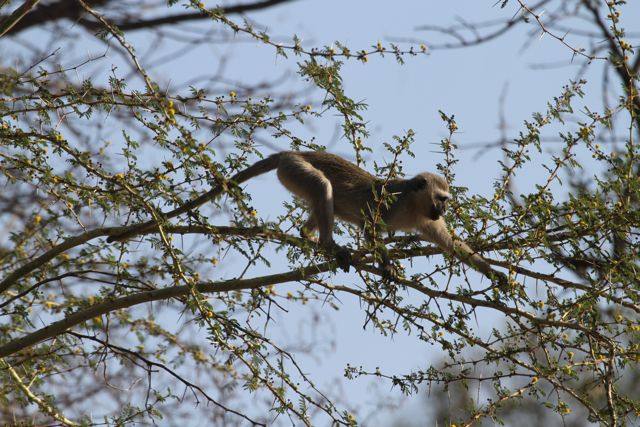Lying in bed I feel like my internal radiator is overheating. There is not a breath of wind and the hot air sits heavy on me like a large invisible elephant. I get up and take a cold shower allowing the air to partially dry me before trying to sleep again. Mercifully before dawn there is a convection wind that sends dry leaves raining down on our tin roof. Breathe deeply - cool air - not cold but cooler.
We take an early morning drive out as the sun inches higher behind the tree line - breathing cool dust laden air . The wind dries my eyeballs, reminding me of a Rolling Stones song from way back when. The song runs around my brain repeating half remembered words. A hyena comes running in to the waterhole flicking his tail. He lies down quickly in the muddy water, drinking it in and lying in it at the same time.
Baboons arrive. The whole troop walks purposefully in. They are earlier today than usual. The hyena is lying down in the water blinking slow blinks - keeping an eye on the comings and goings from the water. Baboons watch him warily and settle on the opposite side of the water, leaning forward to drink - rear ends in the air - tails hanging in a row. Having drunk their fill they file off to the shade of a small hebaclada thorn bush resplendent with yellow pompom flowers. They rest in the shade - mothers feeding small babies, bigger babies hanging on the branches.
The hyena lies flat all day. We start to wonder if he is sick or injured in some way.
There has been an elephant in camp all day. He has been keeping a low profile whenever we walk or drive past. He has been peacefully feeding- leaving large brown droppings along the pathways like giant bran muffins gently steaming. He is hardly visible amongst the greying leaves and tree trunks. Sometime after midday we see him hurrying to the waterhole. The hyena is forced to move away from the waters edge.
Clearly the elephant's radiator is close to boiling as he spends a good half an hour sluicing water onto his parched feet, and throwing water over his back and ears, fanning his ears constantly. Finally he starts to relax and after a long drink he slowly walks off into the grasslands for a change of diet.
The sky is no longer blue, but a soft dust grey.
Evening, and the convection happens in reverse. A welcome breeze cools the sweat running on our bodies and faces. The yellow grasses glow brighter in the late afternoon sun - outshining the sky.
The sun sinks - a giant dayglo beachball in the sky. It descends slowly through the layers of dust fading inch by inch. Francolins proclaim the end of day loudly calling from their vantage points. Daylight ebbs away and the sky belongs to the stars again.













